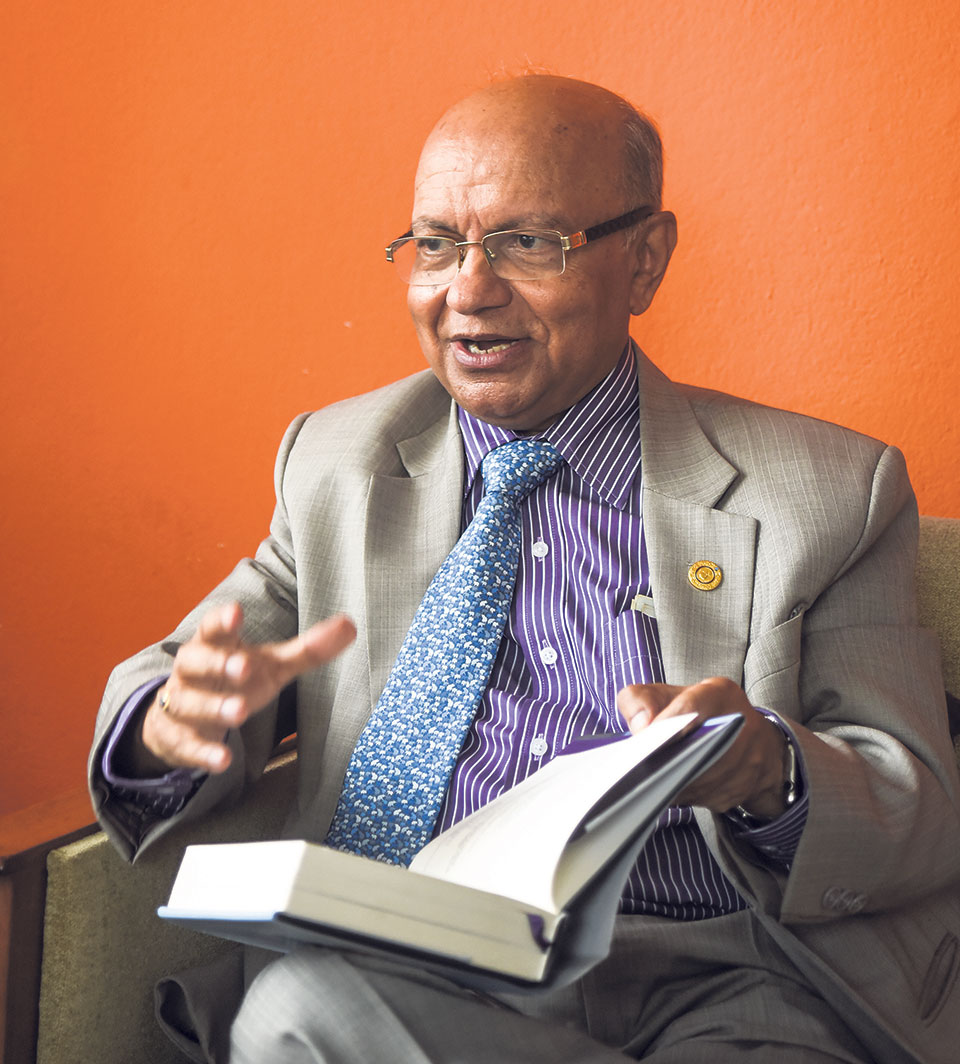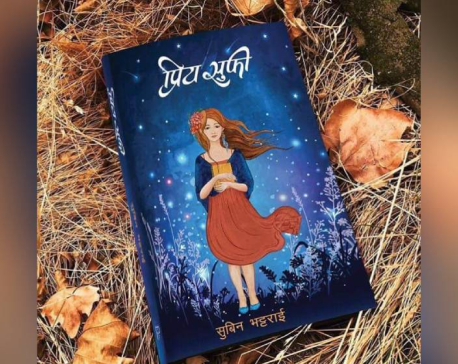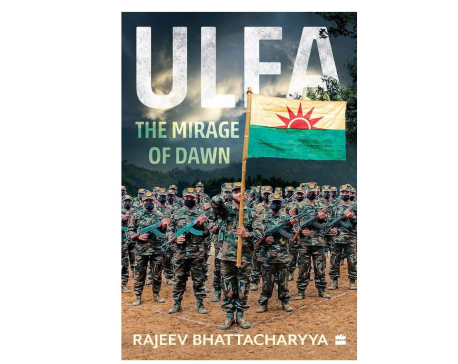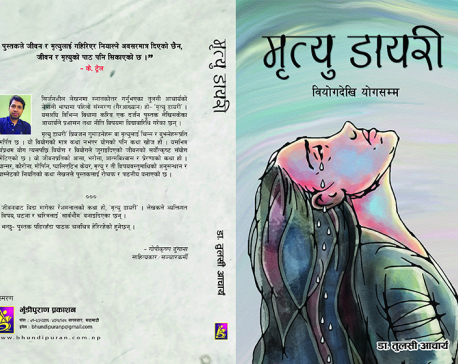
OR

“It’s important to be rooted but it’s even more important to spread your wings and fly,” says Kul Chandra Gautam giving us an insight on how he has lived his life so far. His Wikipedia page describes him as a distinguished diplomat, development professional, and a former senior official of the United Nations. But Gautam is much more than just that.
With a humble and gentle persona and as someone who lives by the motto ‘never be satisfied with mediocrity’, his soft words have the power to stir you. Nothing he says is unimportant or frivolous. Everything has a purpose and you will be able to sample a lot more of that in his recently published memoir, ‘Global Citizen from Gulmi – My Journey from the Hills of Nepal to the Halls of United Nations’. In the book, Gautam narrates his journey from a rural village of Nepal to the high ranks of United Nations in a simple yet impactful way. In a conversation with The Week’s Swasti Gautam, he gave us a deeper insight into his life as well as the lessons he has learnt along the way. We even had him reveal some of his favorite books.
To start with, could you tell us a little about your experience at the United Nations?
My childhood experiences had a huge influence in my work with the UN. My journey first started at UNICEF that basically deals with children’s health and education. It aims to work in areas very similar to my own hometown, Gulmi. As someone who grew up in a place where it was difficult to get education, adequate health services and sufficient nutrition for survival, I knew exactly how UNICEF could act in order to make optimum impact.
My background also made me different from my colleagues at the UN. I had a first hand experience of the situations and places that the organization was trying to deal with. I could empathize with the children in Africa, Latin America, and other war prone areas because I had once been exactly like them. My mindfulness while making international policies stemmed from the fact that I rose from the grassroots.
Initially were you ever hesitant or under confident to work with the biggest delegates of the UN from all over the world?
I would like to think I always had sufficient self-confidence. The reason why I rose rapidly through the ranks of the UN was because my senior bosses realized I had empathy for the poor and the vulnerable. They appreciated my opinions and realized that my childhood experiences and my desire to make a difference were very beneficial for the organization.
Whenever we had a meeting, the views and the solutions that came from other middle or upper class employees working at the UN and the views that came from me would be slightly different. I was always sensible about the needs of the bottom most layer of our society.
You have met international personalities like Nelson Mandela, Aung Sann Su Kyi, and Bill Gates, to name a few. How did these figures influence you and your worldview?
Nelson Mandela was truly a people’s leader. I was shocked to see that the president’s residence had no guards during his rule. He was truly a people’s leader. Bill Gates, at the age of 49, realized that if he wanted to make a difference in the world, he could not wait till he was 65. So he resigned from Microsoft and dedicated his time, money, and energy in helping the needy, especially children. He is a man who made us all realize that if we wanted to perform a good deed, now is the time to do so, there is no point in waiting. I have met these huge and kind personalities but I have also met some dangerous and cruel people, unprecedented dictators, and dangerous wartime killers while working with the UN. I think every person you meet has the power to change you in some way or the other.
Today, when you look back, which moment in your life fill you with immense pride?
There were times in my life when I had no food to eat. I worked at temples and stole peas from the fields when I was hungry. So today, I feel all my achievements are my own earnings. It was not given to me by anyone. No one did me a favor by placing me in a certain position. It was all a result of my own hard work. The sense of achieving something against the odds is what makes me proud.
Another achievement that gives me immense pleasure is that I was also one of the key figures to draft and plan the declaration for Millennium Development Goals which are now known as Sustainable Development Goals or SDGs. Getting the world leaders to agree on one set of goals at the World Summit for Children 1990 was probably the biggest challenge of my life but that also gives me a lot of satisfaction even today.
Bidhya Devi Bhandari said that you are one of the few Nepalis to reach this height. Why do you think our country and its people have not been able to make a significant impact in the international sphere?
If you compare the development of other countries with Nepal, our country is far behind. During my time, there were very few Nepalis who got the privilege of getting an education. So we can safely say that we got into this race very late. Most people holding significant positions in the world belong to countries that were developed far ahead of us. They have received better facilities and education than most of us. So we have no reasons to complain.
Another and an important reason for us not being able to succeed in the world market is that as a country we have not been able to encourage young talents. Our organizations or our government does not support talented individuals who can compete at the global sphere. We only promote our ‘own’ people. This nepotism will make the country suffer in the long run.
In your opinion, what socio-economic and political policies should Nepal make for sustainable growth and development?
For many years Nepal had an instable government that made foreign investors hesitant to invest their time, energy, and money in our country. But now since we have a strong and stable government, I’m optimistic about our future. I have always said that only money cannot bring development. There are countries that are poorer than Nepal and are yet better off. It’s the poverty of our minds that needs to be eradicated first.
The biggest power that we have in our country is our people. So the government needs to spend more on education and nutrition. The government should create skilled population. It does not matter if our people are working abroad but they should be able to get respectable jobs and positions wherever they are.
There is also an urgent need for an atmosphere of confidence in our country. This will attract the investors and create employment. Rule of law, good governance, predictability, and accountability are imperative for sustainable growth and development.
In your book, you say that the public schools of Nepal catering to the poor have now become repository for underachievers. Why do you think the quality of our government schools and colleges is declining each day?
I think the main reason for this is hyper-politicization of all institutions in our country. The schools in my village are in a very deplorable state. The school administration does not look for good teachers while appointing them. They are more concerned about the person’s political affiliations. So it is not about how good a teacher is that secures him or her a job but it is his or her connection that has to be more powerful. Also, we have not inculcated the system of rewarding good performance. The teachers do not get encouragement or incentive to act in a disciplined manner. If we want to succeed, we should learn to value quality.
How do you think the world is looking at Nepal right now? And where are we lacking in our diplomatic relation?
The world is definitely looking at Nepal positively. We are known all over the world for our bravery and loyalty. Every year thousands of Nepalis become a part of the peacekeeping forces of the UN in some of the most dangerous places of the world. Our youth are trusted and respected for their valor in the battlefield. But I personally feel that Nepali delegates can reach the higher ranks of these peacekeeping missions. Nepal has not been able to diplomatically push itself to the powerful law making positions at these peacekeeping projects.
Talking about diplomatic relations, very recently our government changed the Nepali ambassadors in a few countries. Appointing foreign diplomats that favor your own party is a common practice in Nepal but it sends a very wrong signal out in the world. The ambassadors then lose their pride and value in the country where they are placed. Another aspect where we are lacking diplomatically is that we often tend to show our begging bowl mentality to the world. You may be asking for funds but you don’t need to beg for it. For example, our 50,000 female community health volunteer have done a great job. Inspired by us, even the government at Ethiopia has produced around 30,000 volunteers. So instead of begging for funds of healthcare, Nepal should portray itself as a country that can become a model for others. We should make the donor feel that both the countries will benefit with the help that they provide.
On Gautam's bookshelf
Gautam has always been interested in literature and is an avid reader whose love for poetry is evident in his prose. Laxmi Prasad Devkota, Siddhi Charan Shrestha, Lekhnath Poudel, Bhupi Sherchan are some of the poets he confesses he can’t get enough of. He also enjoys reading works of William Wordsworth and William Shakespeare. “I even changed my name and adopted the name of a poet I really admired. You will read more about it in my book,” he says. For now, here’s a list of five books that he really loves, in no particular order.
Muna Madan by Laxmi Prasad Devkota
This book, written in a very simple language, beautifully describes the lifestyle of each Nepali household. I love this book for its straightforwardness and openness. But having said that, it’s also a very powerful piece of literature. Every line has a nice message explained in the simplest way.
Ghumne Mech Mathi Andho Manche by Bhupi Sherchan
Bhupi Sherchan is one of the most loved poets in Nepal. This book makes it quite clear that Sherchan had visionary ideas and a progressive mindset. He questions nationalism, religion and cultures through his book. This book is truly an exemplary piece of work.
One Hundred Years of Solitude by Gabriel García Márquez
The novel written by a German author beautifully projects the Latin American society of 1960s and 70s. The book also describes the conflict between desire for solitude and need for love. I admire this book because it has been able to create a magical yet a very realistic worldview for its readers.
Why I Am A Hindu by Shashi Tharoor
In this book Tharoor, who is also a good friend of mine, examines and studies his own faith. He tries to study one of the oldest religions of this world and also scrutinizes the works of biggest contributors such as Adi Shankara, Swami Vivekananda, Patanjali etc. who created the essence of Hinduism. He also touches upon political Hinduism of modern India.
Capital in the Twenty-First Century by Thomas Piketty
This is a revolutionary book written by the French economist Piketty. The book studies and describes the economic inequality in Europe and America during the 18th century. It also tries to predict the economic future of the world and, like Karl Marx, Piketty believes that grave inequalities can cause financial crisis that may be built in the system itself.
You May Like This

Life is never too pointless to be ended
"Priye Sufi," a book by Nepali author Subin Bhattarai, is a moving and consoling book. The story's primary lesson is... Read More...

'ULFA: The Mirage of Dawn’ offers a remarkably balanced narration on history of ULFA
Rajeev Bhattacharyya’s book offers a remarkable history of ULFA, its formation and rise to prominence, the interplay of its principal... Read More...

Mrityu Diary: A must read book about life and death
"Mrityu Diary" or the “Death Diary” is a book written by the author Tulasi Acharya, which is currently available in... Read More...





Just In
- CM Kandel requests Finance Minister Pun to put Karnali province in priority in upcoming budget
- Australia reduces TR visa age limit and duration as it implements stricter regulations for foreign students
- Govt aims to surpass Rs 10 trillion GDP mark in next five years
- Govt appoints 77 Liaison Officers for mountain climbing management for spring season
- EC decides to permit public vehicles to operate freely on day of by-election
- Fugitive arrested after 26 years
- Indian Potash Ltd secures contract to bring 30,000 tons of urea within 107 days
- CAN adds four players to squad for T20 series against West Indies 'A'













Leave A Comment